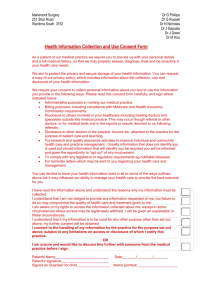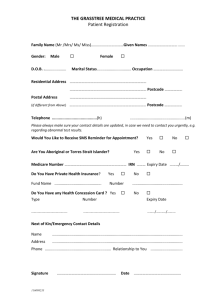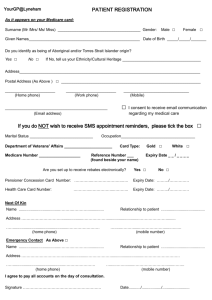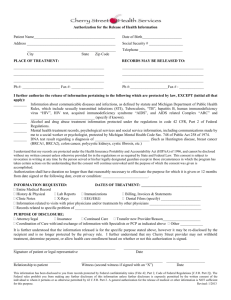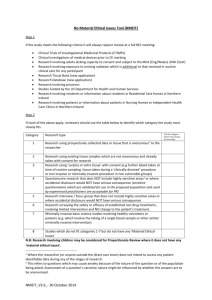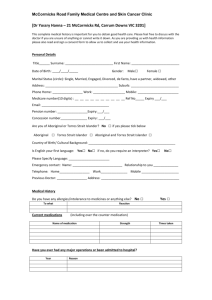word
advertisement
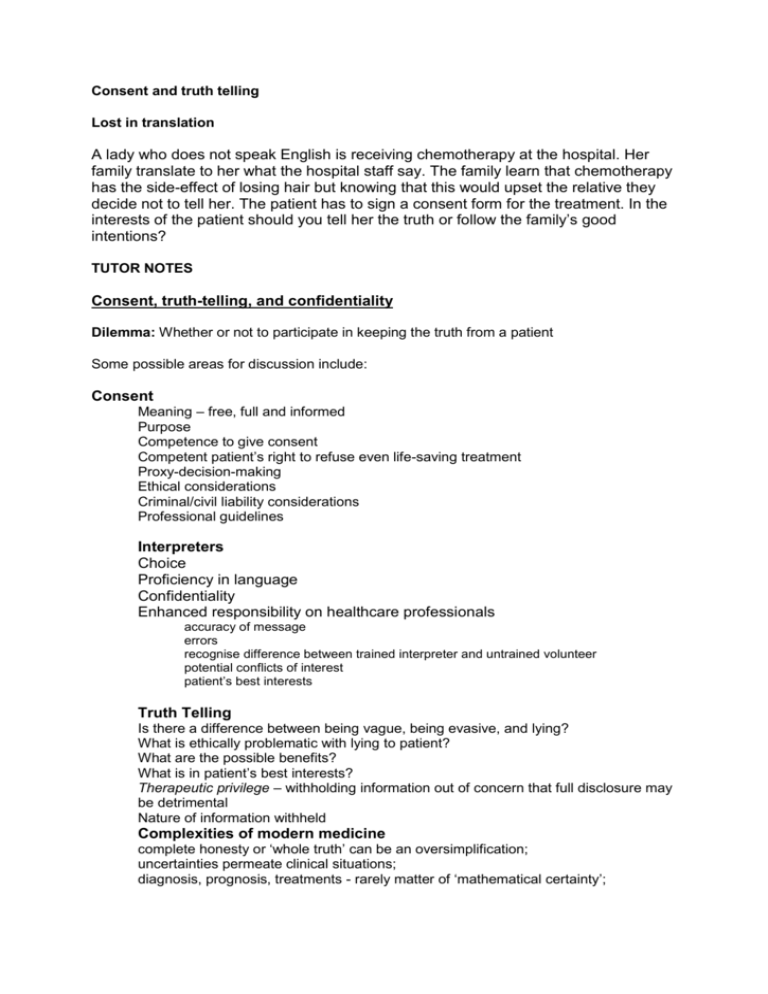
Consent and truth telling Lost in translation A lady who does not speak English is receiving chemotherapy at the hospital. Her family translate to her what the hospital staff say. The family learn that chemotherapy has the side-effect of losing hair but knowing that this would upset the relative they decide not to tell her. The patient has to sign a consent form for the treatment. In the interests of the patient should you tell her the truth or follow the family’s good intentions? TUTOR NOTES Consent, truth-telling, and confidentiality Dilemma: Whether or not to participate in keeping the truth from a patient Some possible areas for discussion include: Consent Meaning – free, full and informed Purpose Competence to give consent Competent patient’s right to refuse even life-saving treatment Proxy-decision-making Ethical considerations Criminal/civil liability considerations Professional guidelines Interpreters Choice Proficiency in language Confidentiality Enhanced responsibility on healthcare professionals accuracy of message errors recognise difference between trained interpreter and untrained volunteer potential conflicts of interest patient’s best interests Truth Telling Is there a difference between being vague, being evasive, and lying? What is ethically problematic with lying to patient? What are the possible benefits? What is in patient’s best interests? Therapeutic privilege – withholding information out of concern that full disclosure may be detrimental Nature of information withheld Complexities of modern medicine complete honesty or ‘whole truth’ can be an oversimplification; uncertainties permeate clinical situations; diagnosis, prognosis, treatments - rarely matter of ‘mathematical certainty’; limits to what a doctor or nurse can disclose with certainty; duties to others besides patients; consider appropriateness of less than full disclosure Complete and partial disclosure o o o o difficult to justify a blatant lie - lying in a clinical context is wrong but less than full disclosure may be morally justifiable? e.g. if a patient is depressed and irrational and suicidal -caution required if full disclosure may contribute to serious harm? wrong not to disclose the truth to a patient when the motive is strong paternalism, or in order to cover up for failures or mistakes, etc., or for selfinterest, or for interests of others? generally speaking, relative certainties and realistic uncertainties should be disclosed - information that a reasonable person needs to know in order to make right health-care decisions reasonable persons unlikely to want/expect full disclosure (even if such were feasible) Withholding information at request of patient withholding information from a patient does not always undermine veracity or violate the truth principle - sometimes patients request that information be withheld doctors sometimes asked to make decisions for patients without communicating relevant information ordinarily, respecting such requests violates no major ethical principle: however, clinical judgement is always required because in some cases, even a reluctant and intimidated patient who requests not to be informed, needs to know some truths not knowing may create a serious danger to self or to others - if so, the patient's request that information be withheld cannot be respected because it violates the core principles of benefience and non-maleficence Withholding information at request of family cultural, religious aspects certain traditional cultures see the patient not as an autonomous entity with inviolable rights but as part of an extended family unit - family members rather than the patient are given medical information - especially threatening information like a fatal diagnosis ethics requires respect for cultural practices (closely related to respect for individual patients) – N.B. cultures change, families are different, and some cultural practices are ethically indefensible - clinical judgment may require that a patient be included in the information cycle rather than cooperating with a cultural practice which prefers communication only with the family who gets what information? - both family and patient can be kept informed and general expectation that all will agree about options - what if do not agree? – best interests judgement clinical judgment not only about patient competency but about what information the patient can cope with and when the family should be involved/take charge Confidentiality adult patients entitled to strict confidentiality - including spouse/family relatives consulted about patient’s best interests only when commensurate with duty of confidentiality and the patient’s wishes if family members provide important medical information not known to the patient, ordinarily they would be told that professional medical ethics requires that a patient be given such information - however, as with other contextual variations, great sensitivity and subtle clinical judgment is required Ethical aspects o o o Protect rights and interests of patients Relationship between healthcare professional and patient: Truthfulness is more than simply passing on accurate information -it expresses an attitude towards another person that seeks to create open and mutually respectful communication Principles o Respect for autonomy Veracity - truthfulness Faithfulness – faithful to patient’s best interests o Non-maleficience duty to patient to ensure no harm is done o Beneficience - act to benefit patient o paternalism o Justice If strong advocate of patient autonomy - tendency to eliminate any professional discretion - require that ‘everything be revealed’ because ‘only the patient can determine what is appropriate’ - other principles, like beneficence, non-maleficence, given little consideration or become subordinate obligations Autonomy cannot be the only principle involved - truth telling linked with beneficence and justice and protection of the community, etc Deontology: assumes that lying and deception are wrong in themselves and that healthcare professionals, like everyone else, have a moral duty to tell the truth Consequentialism: insists that the decision to tell or not to tell depends on the details of the clinical situation and measure of best outcome for all involved Virtues integrity, honesty, veracity, courage, fortitude, respect for others, compassion, fairness, self-control, prudence, etc. Motive(s) for lying important – e,g, - to reduce fear; anxiety; stress - to prevent harm - to enhance well-being - to protect privacy / preserve confidentiality - to help others - to remove patient choice - to protect interests of others Professional aspects Professional guidance o GMC; BMA; RPSGB; NHS/DoH must be competent to communicate well (well-meaning but untrained people can do harm when trying to help in difficult/sensitive situations) telling the truth in the clinical context requires compassion, intelligence, sensitivity, and a commitment to the patient after the truth has been revealed care not to undermine trust and confidence multidisciplinary team - number of professions, each of whom has a professional code and some sense of responsibility for telling the truth traditionally, the doctor is responsible for all communication with patients and families (today, nurses, etc. also claim responsibility for truthful communication with patients and families as ‘patient advocates’) Legal aspects common law consent to treatment absolute right to not be treated against will competence and decision-making no-one can give or withhold consent to medical treatment on behalf of another adult duty of candour? therapeutic privilege material/significant risks – level of risk warranting disclosure not developed full doctrine of ‘informed consent’ requiring patients to be given full information legal status of ‘consent forms’ competence o understanding/believing/weighing up information o freely given criminal/civil liability Summary points Telling the truth – demonstrates respect for person; enables informed decisions (self-determination); social contract; establishes trust and confidence Telling the truth in a clinical context is an ethical obligation but determining just what constitutes the ‘truth’ is a matter of clinical judgment; Issue of deciding just what to disclose may be compounded by the difficulty of deciding the right person to make the disclosure Co-ordination of truth-telling raises potential difficulties – one person who is not truthful is likely to be exposed by another ETHICAL DECISION-MAKING Is the question an ethical one? Legal and professional issues but the also ethical issues: Avoiding harm, Doing good, Confidentiality, Truth telling, Faithfulness Step 1 – Gather relevant information Step 2 – Identify type of ethical problem rights and best interests of patient withholding information Step 3 – Analyse problem principles of autonomy, non-maleficence; beneficence; faithfulness; veracity Step 4 – explore options/solutions deontological approach – weighing of conflicting principles/conflict of duties – which course of action best respects duties and rights? utilitarian approach – consider all potential consequences (to all parties involved) – what benefits and harms will each course of action produce and which will lead to best overall consequences? virtues approach – which course of action develops moral virtues? alternative courses of action, e.g. do not tell patient ↪ sufficiently informed to provide valid consent appropriate? ↪ consequences of disclosure (therapeutic privilege) ↪ patient autonomy undermined ↪ loss of trust? ↪ patient response when side-effects become apparent/informed by another, etc.? ↪ honesty also matters to doctors and other healthcare professionals↪ loss of reputation for honesty - end of a profession? incomplete disclosure ↪ what is appropriate to withhold? complete disclosure ↪ patient fully informed ↪ patient confidence in efficacy of treatment? ↪ fulfil patients’ need for honesty when ill, vulnerable, and burdened with pressing questions which require truthful answers ↪ appropriate person(s) to tell patient specific information (who; when; what)? ↪ how do you know information has been accurately imparted? N.B. frequently, there are no definitive right answers, only answers that are more or less reasonable, more or less defensible: two people may come to an opposite decision using the same information - it depends on how important each consideration is to each person and also the degree to which an individual takes a “deontologist“ or a “consequentialist” approach. Step 5 – make decision Step 6 – assess and reflect Discussion review/links Pharmacist responsibilities and accountability Consent to medical treatment Patient preferences Surrogate-decision making Health/sickness role - cross-cultural aspects - language; geographical; religious; family structure; relationships - role of family in disclosure; consent; decision-making (hierarchy of decisionmaking); conflict resolution Ethics and role of interpreters
